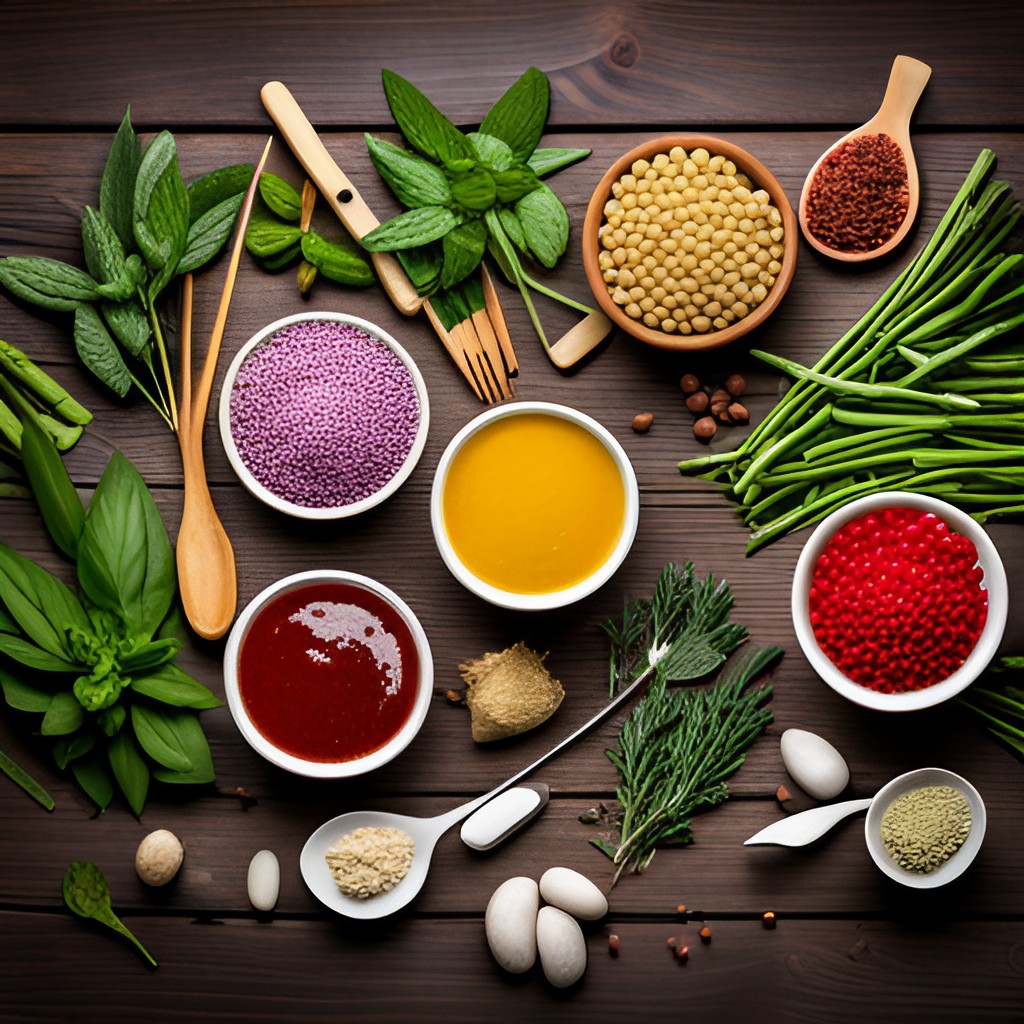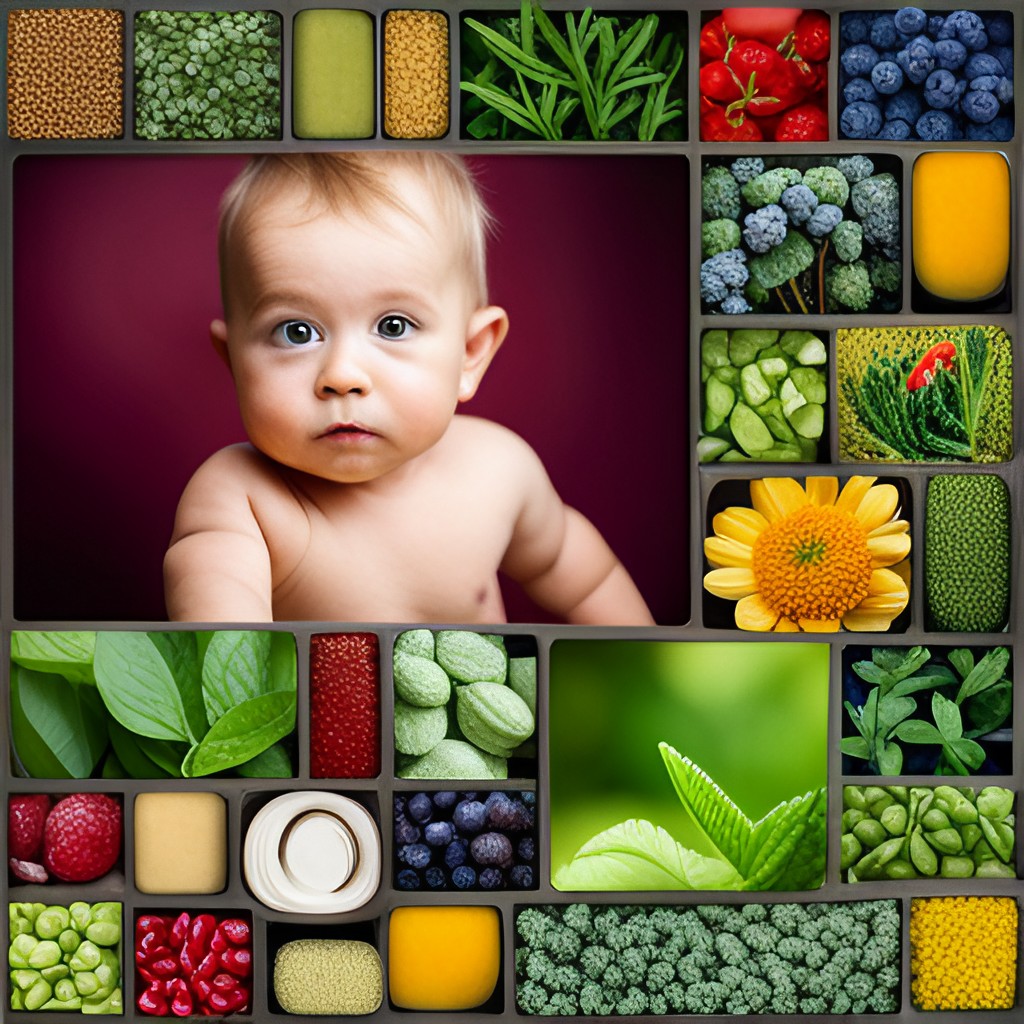Are there any herbs that are good for babies? Absolutely! Herbs have been used centuries to soothe and nourish babies, providing natural remedies for common ailments. It might surprise you to know that several herbs are good for babies and can even help ease common infant ailments.
As a parent, there’s nothing more important than the health and well-being of your little one, and herbs can be a great way to support that. From aiding digestion to promoting restful sleep, these natural remedies can be a gentle and effective addition to your baby’s routine. So let’s take a closer look at some of the most beneficial herbs for babies and how they can work wonders for your little angel.
Introducing Herbs

The history of herbs is quite fascinating. Herbs were used in Egypt as far back as 3000 BC. During the medieval period, herbs were highly demanded and cultivated for medicinal purposes. In fact, the famous physician Hippocrates believed that herbs had incredible healing powers and that they could cure various diseases. As trade routes opened up, introduce herbs to different cultures, and their uses continued to expand.
Today, herbs are used for a variety of purposes. They are used in cooking to add flavor and aroma to food, and some herbs, such as garlic and ginger, are also used for their medicinal qualities. Herbal teas are also a popular way to consume herbs. They are a traditional remedy for coughs, colds, and other respiratory problems. In addition, many people use herbs in skincare and haircare products as they provide a natural remedy to many skin problems.
The Benefits of Herbs to Babies

Before we look at some herbs that are good for babies, let’s explore the benefits of using herbs with your little one.
1: No Chemical/Synthetic
One of the biggest benefits of natural remedies is that they are chemical-free and synthetic-free. Unlike many over-the-counter medicines, natural remedies do not contain any harsh chemicals that could harm your baby’s delicate system. Instead, natural remedies are made from herbs and other natural ingredients that are gentle and safe for babies.
2: Supports the Immune System
Many herbs and natural ingredients have immune-boosting properties that can help protect your baby from illness and disease. Natural remedies can also help your baby build up their natural defenses, making them stronger and more resilient in the long run.
3: Safe and Effective
Natural remedies have been used for centuries and for good reason. They are safe and effective and have been proven to help with a wide range of health issues. And while many over-the-counter medicines can have negative side effects, natural remedies are gentle and much less likely to cause harm.
4: Reduces the Need for Harsh Medications
Using natural remedies for babies can also help reduce the need for harsh medications. Many common childhood ailments, such as minor colds and coughs, can be treated with natural remedies, eliminating the need for antibiotics or other strong medications. It can be especially beneficial for parents who want to limit their child’s exposure to chemicals and other synthetic substances.
5: Creates a Bonding Experience
Using natural remedies can create a bonding experience between parents and babies. Taking care of your child’s health and well-being can be a rewarding and fulfilling experience, especially when you’re using natural remedies that you’ve made or prepared yourself. It can also be a great way to connect with your baby as you work together to soothe their discomfort and keep them healthy.
These are just a few benefits of using natural remedies for babies. Now let’s look at some medicinal herbs that are good for babies and how you can use them.
Common Herbs That Are Good For Babies
I know that as a parent, you always want the best for your little one. So here are 8 fresh herbs that can help support your baby’s overall health and wellness:
Disclaimer: Before using any herbs for babies, it is essential to consult with your doctor or healthcare provider.
1: Turmeric
Turmeric has been used for thousands of years in Ayurvedic and traditional Chinese medicine to treat various health conditions. It’s a natural remedy for colds, coughs, and fever. Turmeric is also known to have anti-inflammatory properties that can help ease pain and inflammation in the body.
Turmeric can be especially useful for babies starting to develop their immune systems. The herb can help strengthen their immune system and protect them from common illnesses like colds and flu. Turmeric contains a compound called curcumin, one of the most potent antioxidants in nature. Curcumin helps protect the body from free radicals and oxidative stress, which are linked to various health problems, including cancer and heart disease.
How to Incorporate Turmeric
One of the easiest ways to incorporate turmeric into your baby’s diet is by adding it to their food. Mix a pinch of turmeric powder into their mashed potatoes, avocado, or yogurt. Add turmeric to soups or stews if your baby is already eating solid foods. Just be careful not to overdo it! Too much turmeric can have a slightly bitter taste and stain your baby’s clothes and skin yellow.
Another way to introduce turmeric to your baby’s diet is by giving them turmeric milk. This is a simple and delicious drink that can be enjoyed at any time of the day. To make turmeric milk, simply heat some milk in a saucepan and add a pinch of turmeric powder and a sweetener of your choice, such as honey or maple syrup. Stir well and serve warm. This drink is nutritious and a great way to soothe your baby’s throat if they have a cough or a cold.
2: Chamomile
Chamomile is a daisy-like plant that is native to Europe and Asia, but it is now grown all over the world. The plant has been used for medicinal purposes for thousands of years. The ancient Egyptians, Romans, and Greeks all used chamomile for its healing properties. The plant was even used as a cure-all during the Middle Ages. Today, chamomile is still widely used for its many benefits, and it’s especially popular among parents looking for natural remedies for their babies.
So, how can chamomile help babies? One of the biggest benefits of chamomile is its calming and soothing properties. Chamomile tea is a popular remedy for colic and fussiness in babies. It can help calm your baby’s digestive system and relieve gas and bloating. Chamomile is a natural pain reliever that can help ease teething pain. In addition, chamomile can help your baby sleep better. It relaxes the body and can help your little one fall asleep faster and stay asleep longer.
How to Incorporate Turmeric
Now that you know how chamomile can help your baby, let’s talk about incorporating it into your little one’s routine. One of the easiest ways to use chamomile is to make chamomile tea. Simply steep a chamomile tea bag in hot water and let it cool to room temperature. You can give your baby a few sips of the tea to help calm their stomach or help them sleep. Another way to use chamomile is to add a few drops of chamomile essential oil to a diffuser. The chamomile bath can help relax your baby and make them feel more comfortable.
There are a few things to keep in mind when using chamomile for your baby. First, always talk to your pediatrician before using any natural remedies. While chamomile is generally safe, there may be some exceptions. Also, be sure to use chamomile in moderation. While using chamomile in small amounts is safe, overuse can lead to drowsiness and other side effects.
3: Cinnamon
The history of cinnamon dates back to ancient Egypt and China. Egyptian royalty used cinnamon in their embalming process, while the Chinese used it in traditional medicine. It wasn’t until later that it became popular in the Western world as a culinary spice.
Studies have shown that cinnamon has anti-inflammatory properties and can act as an antioxidant. It also has antimicrobial properties for babies, which can help fight viruses and bacteria in the body. Cinnamon also has numerous health benefits for babies. It can help regulate blood sugar levels by increasing insulin sensitivity, which is especially important for babies with a family history of diabetes. Additionally, it can aid in digestion and prevent constipation.
How to Incorporate Cinnamon
One way is to add a small amount to your baby’s cereals, baby’s oatmeal, or purees. You can also sprinkle cinnamon on baked fruit like apples or pears or mix it into a smoothie. It is important to note that you should not give cinnamon to babies under six months of age. For babies over six months, it is safe to use in moderation. Remember, a little goes a long way since too much can be overpowering and potentially harmful.
4: Calendula
Calendula, also known as pot marigold, has been used for hundreds of years for various medicinal purposes. It’s common in parts of the world, like Europe and Asia, and is used to help with many symptoms, such as infections, swelling, and diaper brashes. In traditional medicine, they used calendula to treat scalded skin, stomach ulcers, mouth sores, and other ailments.
Calendula has multiple benefits that can help with infant problems like diaper rash, eczema, teething troubles, and more. It has anti-inflammatory and anti-fungal properties that can reduce redness, swelling, and pain, making it perfect for skin irritations. With its antibacterial agents, calendula can help prevent infections and relieve itches from insect bites. It’s also a mild sedative, aiding sleep and anxiety problems.
How to Incorporate Calendula
Calendula is beneficial when used topically as a cream or oil or infused calendula into a herbal tea for your baby. Many organic baby products incorporate calendula, especially in diaper creams, baby shampoos, body soaps, and often in teething oil. You can create your DIY Calendula cream at home by infusing calendula petals in a carrier like olive oil or coconut oil for two weeks in a dark place. The result will be a beautiful, bright orange salve that you can use on your baby’s sensitive itchy skin.
Calendula is usually safe for topical use, but some babies can have allergic reactions to the herb. Before using it, testing on a small skin patch and monitoring the area for adverse reactions is essential.
5: Elderflower and Elderberry
Elderflower and elderberry have been used for hundreds of years for their medicinal properties. The Elder tree, from which these herbs are derived, is considered sacred in several cultures due to its healing properties. The ancient Greeks and Romans used elderberry to treat common ailments such as colds, flu, and fever. The Native Americans also used the elderberry plant to cure several illnesses. Given the rich history of Elderflower and Elderberry, it is no surprise that they continue to be used today.
Elderflower and elderberry are rich in antioxidants that help boost your baby’s immune system. These herbs contain vitamin C, vitamin A, and flavonoids that fight off infections and illnesses. If your baby is suffering from a cold or flu, elderberry syrup can be a great option to help ease their symptoms. Elderflower tea can also work wonders when you are struggling to soothe your baby to sleep.
How to Incorporate Elderflower and Elderberry
You can incorporate Elderflower and elderberry into your baby’s diet in several ways. So, you can start by making elderflower tea and giving your baby a few sips in their sippy cup. Elderberry syrup can be mixed with warm water or breast milk and given to your baby daily to help boost their immune system. You can also add elderberry syrup to your baby’s homemade smoothies to make them more enjoyable.
It is important to note that you should only give these herbs to babies who are six months or older. When introducing elderberry or elderflower, always start with a small amount to avoid allergic reactions. It is recommended to consult your pediatrician before incorporating herbal remedies into your baby’s diet.
6: Mint
Mint, also known as Mentha, has been a part of traditional medicine for centuries. It is believed to have originated in the Mediterranean region and was later introduced to Europe and America. In ancient times, mint was a common ingredient in medicines because of its soothing properties. It is known to have anti-inflammatory effects and can relieve digestive issues like nausea, bloating, and cramps. Moreover, several studies have shown that mint can help reduce stress levels, reduce fever, and alleviate respiratory problems.
Mint is a natural digestive aid and is extremely beneficial for babies who suffer from colic, gas, or other digestive disorders. It helps soothe the gastrointestinal tract and eases the flow of gas, thereby reducing the discomfort in the baby’s tummy. The antispasmodic properties in mint can help to relax the baby’s muscles in the digestive tract, thereby reducing colic symptoms. Moreover, mint has anti bacterial infections properties that help fight off harmful bacteria in the baby’s gut, preventing infections. Mint also has a calming effect on the baby’s nerves, which can help them sleep better.
How to Incorporate Mint
There are several ways you can incorporate mint into your baby’s diet. One of the easiest and most common ways is to give your baby a small amount of mint tea. Mint tea can help relieve stomach aches, colic, and respiratory problems. It is also a great way to keep your baby hydrated. To make mint tea, take a few leaves of fresh mint and boil it in water for 5-10 minutes. Let it cool down, and then strain the tea. You can add a small amount of honey or lemon for taste.
Another way to incorporate mint into your baby’s diet is by using it in cooking. You can add a few leaves of fresh mint to pureed vegetables or fruit. It can also be used as a garnish for soups or stews. Mint leaves can also be added to homemade yogurt or fruit smoothies, making it a healthy and nutritious snack for your little one.
7: Oregano
Oregano has been used for centuries as a natural remedy for various health issues. This herb is native to the Mediterranean region and belongs to the mint family. Oregano contains powerful antioxidants, minerals, and vitamins vital to keeping our bodies healthy. In ancient times, oregano was used as a natural antiseptic, anti-inflammatory, and antiviral herb to treat ailments like colds and coughs. It also has a strong aroma and flavor that can enhance the taste of our food.
Oregano has antiviral and antibacterial properties, which can help fight off infections, particularly respiratory infections such as colds and coughs. Oregano also has anti-fungal properties, which make it useful in preventing fungal infections such as thrush in babies. Additionally, oregano can help improve digestion and reduce inflammation in the gut, making it an excellent herb for babies with colic or digestive issues. It is also effective against stomach upsets and diarrhea.
How to Incorporate Oregano
One of the easiest ways is adding it to your baby’s food while cooking. For instance, you can add oregano leaves to your baby’s soups, stews, and purees to enhance the flavor and provide added health benefits. You can add Oregano oil to your baby’s massage oil to ease colic and promote relaxation. You can also make oregano tea by steeping a few leaves in boiling water and giving it to your baby. Additionally, you can give your little one oregano supplements in consultation with your pediatrician.
It is important to note that while oregano is safe, you can use it in moderation and under the guidance of a pediatrician. Oregano oil can be too strong for infants under six months and cause skin irritation. For this reason, it should be diluted with carrier oil before use. If your baby is allergic to oregano or any other herb, it is best to avoid using it.
8: Basil
Basil has been a celebrated herb in many cultures for centuries. It originated in India and was introduced to the Mediterranean during the times of the ancient Greeks and Romans. The herb has medicinal qualities and has been used since ancient times to treat various ailments. It is rich in antioxidants, essential oils, and vitamins and is known for its anti-inflammatory, anti-bacterial, and anti-fungal properties.
It has a natural calming effect that can soothe colicky babies. Its anti-inflammatory properties can help relieve inflammation caused by teething, fever, and other ailments. Basil is also a natural anti-bacterial and anti-fungal agent, which can help protect your baby against infections. Its antioxidant-rich nature can help boost your baby’s immunity and protect them from various illnesses.
How to Incorporate Basil
You can start by adding small amounts of fresh basil leaves to your baby’s meals, such as pureed vegetables or fruits. You can also dry the leaves, grind them into a fine powder, and add them to your baby’s food. Basil is also a perfect addition to your baby’s teas, which can help soothe digestive issues, boost immunity, and ease colic. Always consult your pediatrician before introducing new food to your baby’s diet.
Growing your basil can be a fun activity for you and your baby. You can grow it in pots or a small herb garden. Fresh basil is richer in flavor and nutrients than dried basil, making it a better choice for your baby’s meals.
These are just some of the many herbs that can benefit your baby. Always consult a doctor before introducing herbs to your baby’s diet, as they may have allergies or sensitivities to certain ingredients.
Tips To Monitor Your Baby After Taking Herbal Supplements
So, how to make sure your baby is safe after taking herbal supplements? Here are a few tips:
✔️Know What To Expect
Before giving your baby herbal supplements, ensure you know what to expect. Research the specific supplement you plan to use and talk to your pediatrician about the potential side effects. This way, you will know what to look for in case your baby has a negative reaction to the herbs. Always start with the smallest possible dose to see how your baby responds.
✔️Look Out For Any Signs
After giving your baby herbal supplements, watch them closely for any signs of allergic reactions or side effects. Common signs of your baby experiencing a negative reaction include rashes, hives, difficulty breathing, or gastrointestinal problems.
✔️Record The Dosage And Time Of Day
It’s essential to keep track of the herbal supplement dosage and time of day it was given. This can help you determine if any negative reactions are related to the supplement’s use. You can use a journal or an app to record this information for easy reference.
✔️Have A Conversation With Your Pediatrician
Before starting any herbal supplements, having a conversation with your pediatrician is essential. Your pediatrician can advise you on which supplements are safe for your baby and how to give them safely. You can also update your pediatrician on any side effects your baby experiences.
✔️Do Not Replace Medications
Herbal remedies are typically used as a complementary approach to traditional medicine. However, it’s important to note that you should not use them to replace medications. Always follow your pediatrician’s recommendations for treatment, and let them know if you plan to try a herbal supplement.
Doing this lets you keep your baby healthy and safe while using herbal supplements. Remember, don’t hesitate to talk with your pediatrician for guidance and support if you have any concerns or questions.
Frequently Asked Questions
Q: Can I give herbs to my newborn baby?
It is a common question that arises for parents who are interested in natural and holistic remedies. While using herbs for a newborn baby should be approached with caution, certain herbs can be beneficial. For example, chamomile tea can aid digestion and soothe infant colic symptoms. However, it’s essential to consult a healthcare professional before giving any herbs or supplements to a newborn, as they have delicate systems and may react differently to certain herbs.
Q: Can I give herbal teas to my baby?
Herbal teas can be a great way to introduce natural remedies to your baby’s routine. However, it’s important to remember that some herbs can be harmful to babies and should be avoided. Always research the herbs you plan to use and ensure they are safe for your baby’s age and development. Additionally, you can introduce herbal teas slowly and in small amounts to gauge your baby’s reaction and determine their allergies or sensitivities.
Q: Can I use herbs in conjunction with traditional baby medicine?
Yes, herbs can be used in conjunction with traditional baby medicine with the guidance of a healthcare professional. In fact, some herbs can complement certain medications and enhance their effects. For example, ginger can aid digestion and reduce nausea, which can be helpful for babies taking certain medications. However, it’s important to communicate with your healthcare provider and disclose any herbs or supplements you plan to use with traditional medicine.
Final Words
After all the information above, it is clear that herbs can be a great way to boost your baby’s health and protect them from illnesses. Who would have known that these tiny plants could have such a huge impact on our little ones? From easing stomach discomfort to promoting better sleep, there’s an herb for every baby. I’m excited to explore the world of herbal remedies and find ways to make little ones in the house even healthier! Always consult with a healthcare professional before introducing herbs or supplements to your baby’s dietary routine. With that in mind, have fun exploring these natural remedies and enjoy the journey!


